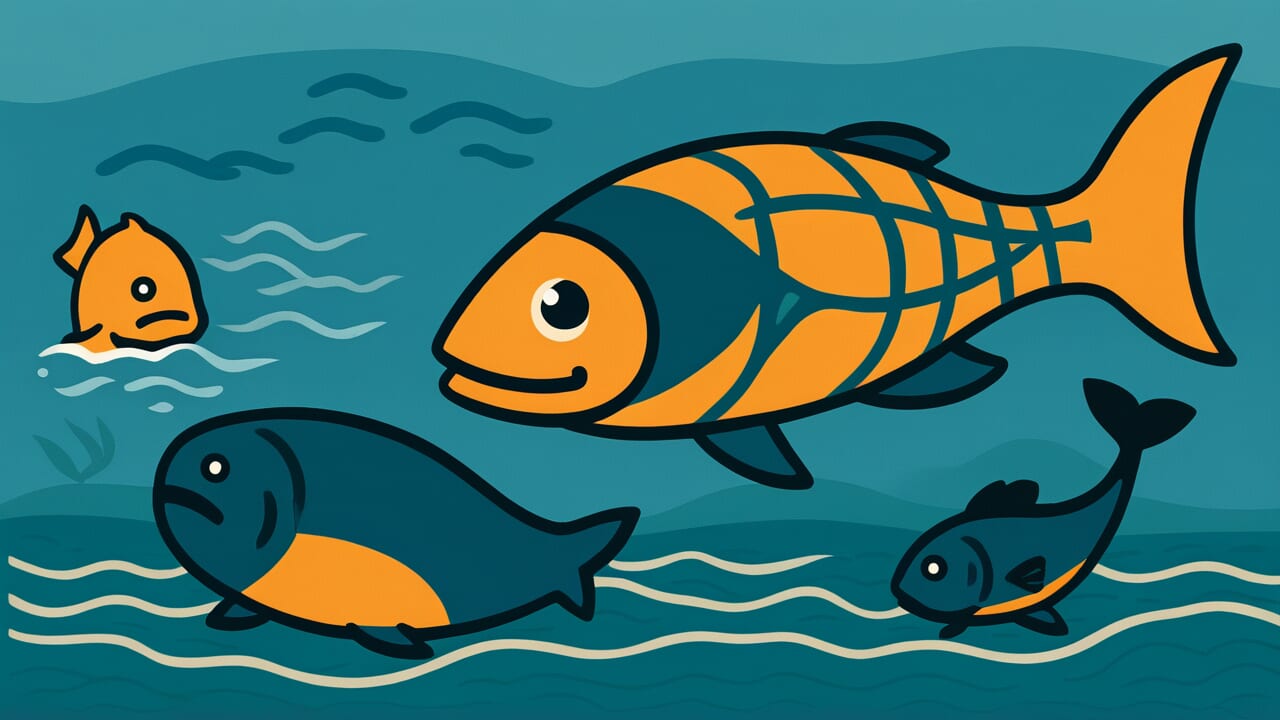How to Read “Big fish eat small fish”
おおきなさかながちいさなさかなをくう
Meaning of “Big fish eat small fish”
“Big fish eat small fish” means that the strong dominate and sacrifice the weak. It describes situations where powerful people one-sidedly use or exploit those without power.
This proverb is used to critically point out unfair power relationships in society. For example, it applies when large corporations pressure small businesses, or when those in power ignore the interests of vulnerable people.
By using the easy-to-understand metaphor of the food chain in nature, it vividly depicts the imbalance of power in human society.
Even today, this phrase works as an effective expression when discussing economic inequality and abuse of power. As a warning against societies ruled by survival-of-the-fittest logic, it reminds us of the importance of fairness.
Origin and Etymology
The exact origin of this proverb is unclear, but it has likely been used since ancient times as an expression applying natural laws to human society.
If you look at the sea or rivers, the sight of big fish preying on small fish is a daily occurrence in nature. In Japan, where fishing was central to life, people witnessed this survival-of-the-fittest reality every day.
When they pulled up their nets, it wasn’t unusual to find small fish coming out of larger fish’s stomachs. From such observations, the idea of overlapping nature’s laws with human power structures was born.
What’s interesting is that this proverb wasn’t used merely as a record of natural observation, but with social criticism embedded in it. It was likely passed down among common people as a warning against structures where the strong unilaterally dominate the weak.
During the Edo period, this phrase may have been used in various contexts, such as the class system or relationships between merchants and farmers.
Expressing the absurdity of human society through natural phenomena that everyone can understand—this may be why this proverb has survived for so long.
Usage Examples
- In the industry restructuring, major companies are absorbing small businesses one after another—it’s exactly a case of big fish eat small fish
- In the global economy, big fish eat small fish as countries with capital power take resources from weaker nations
Universal Wisdom
The proverb “Big fish eat small fish” brilliantly captures the power structures that exist universally in human society. Why does humanity repeat this unfair relationship regardless of time or place?
The answer may lie in the fundamental instinct of survival competition. To survive, to protect one’s group, people sometimes make choices that sacrifice others. The moment people gain power, they want to use it. That’s human nature.
However, this proverb has been passed down for centuries not just to describe reality. It contains the question: “Is this right?”
In nature, it may be natural for big fish to eat small fish, but should we accept this as natural in human society? Precisely because humans have reason, can’t we build a society that transcends survival of the fittest?
Through these words, our ancestors continued to question societies driven only by the logic of power. This is also proof that humans have hearts that seek fairness.
Not being swept away by the logic of the strong, but thinking about those in weak positions—such imagination is the true wisdom this proverb continues to convey to us.
When AI Hears This
In the ocean, big fish eat small fish. Those big fish are eaten by even bigger fish. When you express this relationship mathematically, surprisingly, the relationship between fish size and population follows a power law.
In other words, when body weight increases tenfold, the population becomes about one-hundredth. This ratio remains almost constant from plankton to tuna.
This is what complexity science calls scale invariance—a phenomenon where the same pattern repeats at every level. It’s the same structure as coastlines, which show similar jagged patterns whether you zoom in or out.
The same law operates in the business world. When you arrange global companies by size, companies with ten times the revenue are about one-tenth in number.
The structure of large corporations acquiring small businesses, and those large corporations being absorbed by even bigger ones, is mathematically equivalent to the fish food chain.
Even more surprising is that the same pattern is observed on a cosmic scale. Galaxy collisions and mergers also follow the same power law in the relationship between mass and frequency.
From microscopic cell predation to macroscopic galaxies, nature is copy-pasting the simple rule of “big eats small” across all scales.
Lessons for Today
This proverb gives us two important perspectives. One is when you’re in a weak position. When you feel crushed by unreasonable force, it’s not because your value is low.
There’s simply a structural problem of power imbalance. This recognition will free you from blaming yourself.
The other is when you stand in a strong position. When you get promoted, achieve success, or gain influence—that’s when you should remember these words.
Having power inherently carries responsibility. When your decisions affect someone’s life, I hope you can be a person who feels that weight.
In modern society, we become both strong and weak depending on the situation. That’s why it’s important to have both perspectives.
Being a strong person who can imagine the pain of those in weak positions. And being a weak person with the strength not to yield to unreasonable power.
This proverb is an eternal guide to becoming a person with such balance.



Comments